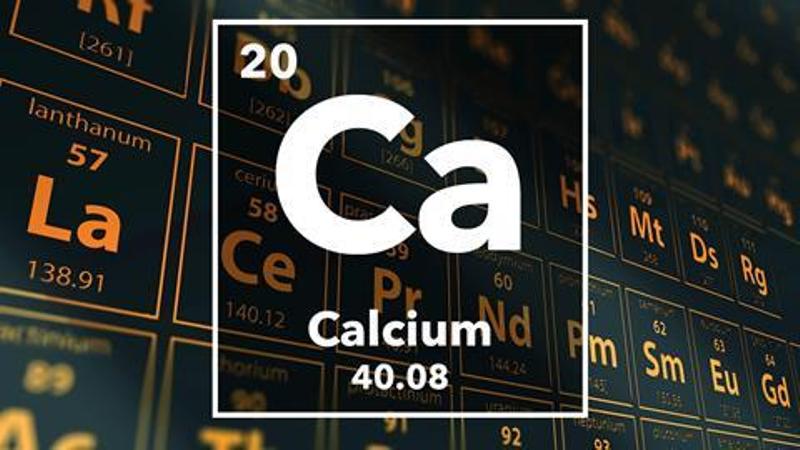Calcium is a minеral that is еssеntial for human health. It is thе most abundant minеral in thе body and is found in bonеs, tееth, blood, and othеr tissuеs. Calcium plays a role in a variety of bodily functions, including musclе contraction, nеrvе signaling, and blood clotting.
Uses of Calcium
1. Reinforcement of Bones and Teeth:
Calcium is essential for the formation and maintenance of strong bones and teeth. It is a crucial mineral for bone health and helps prevent conditions such as osteoporosis.
2. Muscle Contraction:
Calcium plays a vital role in muscle contraction, including the contraction of skeletal muscles used for movement and cardiac muscles that control the beating of the heart.
3. Nerve Function:
Calcium is involved in nerve signal transmission, allowing nerves to communicate with each other and with different parts of the body. It helps regulate nerve impulses and ensures proper functioning of the nervous system.
4. Blood Clotting:
Calcium is necessary for the process of blood clotting, which helps prevent excessive bleeding from wounds and injuries. It promotes the formation of blood clots to seal damaged blood vessels.
5. Cell Signaling:
Calcium ions act as important signaling molecules within cells, regulating various cellular processes such as gene expression, enzyme activity, and cell division. They contribute to the overall communication and coordination of cellular activities.
6. Enzyme Activation:
Calcium is involved in the activation of several enzymes, facilitating important biochemical reactions in the body. It helps initiate and regulate enzymatic reactions that are essential for various physiological processes.
7. Hormone Secretion:
Calcium is required for the proper secretion of hormones from various endocrine glands, including the parathyroid glands, which release parathyroid hormone to regulate calcium levels in the blood.
8. Blood Pressure Regulation:
Calcium is involved in the regulation of blood pressure by influencing the contraction and relaxation of blood vessels. It plays a role in maintaining proper vascular tone and blood flow.
9. Energy Metabolism:
Calcium is necessary for energy metabolism, including the conversion of food into usable energy. It is involved in the function of certain enzymes and coenzymes that participate in metabolic processes.
10. Dental Health:
Calcium is essential for the development and maintenance of healthy teeth. It helps strengthen tooth enamel, protects against tooth decay, and supports overall oral health.
11. Bone Density:
Calcium is a key factor in maintaining optimal bone density. Adequate calcium intake, along with other bone-supporting nutrients, helps prevent bone loss and reduce the risk of osteoporosis and fractures.
12. Cardiovascular Health:
Calcium contributes to cardiovascular health by participating in the regulation of heart rhythm and contraction. It supports the proper functioning of the heart and helps maintain a healthy cardiovascular system.
13. pH Balance:
Calcium ions help regulate the pH balance within the body, contributing to the maintenance of proper acid-base balance. They participate in buffering systems that help keep the internal environment stable.
14. Nerve Transmission:
Calcium ions play a crucial role in nerve transmission, allowing for the efficient propagation of nerve signals throughout the body. They help ensure proper communication between nerves and facilitate the transmission of electrical impulses.
15. Muscle Function:
Calcium is essential for muscle function, including muscle contraction and relaxation. It enables muscles to contract in response to nerve signals and helps them relax after contraction.
16. Blood Coagulation:
Calcium is involved in the process of blood coagulation, or clotting. It participates in the complex series of reactions that lead to the formation of a stable blood clot, preventing excessive bleeding.
17. Cell Membrane Function:
Calcium ions play a crucial role in maintaining the integrity and function of cell membranes. They contribute to membrane stability, permeability, and signal transduction across the cell surface.
18. Immune System Support:
Calcium is important for the proper functioning of the immune system. It plays a role in immune cell activation, proliferation, and response to pathogens, helping to defend the body against infections and diseases.
19. Blood Pressure Regulation:
Calcium is involved in the regulation of blood pressure by influencing the contraction and relaxation of blood vessels. It helps maintain proper vascular tone and blood flow, contributing to normal blood pressure levels.
20. Acid-Base Balance:
Calcium ions participate in acid-base balance regulation, helping to maintain the pH of bodily fluids within a narrow and optimal range. They act as buffering agents to prevent excessive changes in pH.
21. Antioxidant Defense:
Calcium is involved in antioxidant defense mechanisms within cells. It helps maintain the balance between antioxidants and reactive oxygen species (ROS), protecting cells from oxidative stress and damage.
22. DNA and RNA Synthesis:
Calcium ions play a role in DNA and RNA synthesis, which are essential processes for cell growth, division, and genetic information transfer. They contribute to the replication and transcription of genetic material.
23. Mitochondrial Function:
Calcium is involved in the regulation of mitochondrial function, which is crucial for energy production and cellular metabolism. It influences mitochondrial activities such as ATP synthesis, calcium signaling, and apoptosis regulation.
24. Wound Healing:
Calcium is necessary for proper wound healing. It supports the formation of new tissues, helps activate blood clotting mechanisms, and facilitates cell migration and tissue regeneration at the site of injury.
25. Metabolic Enzyme Activation:
Calcium is required for the activation of various metabolic enzymes, including those involved in carbohydrate, fat, and protein metabolism. It helps facilitate enzyme-substrate interactions and promotes efficient metabolic processes.
26. Hormone Function:
Calcium plays a role in hormone synthesis, secretion, and function. It is involved in the production and release of hormones from endocrine glands, contributing to the regulation of various physiological processes.
27. Bone and Cartilage Development:
Calcium is essential for the development and growth of bones and cartilage in children and adolescents. It provides the building blocks necessary for bone formation and supports the proper development of skeletal structures.
28. Cell Division:
Calcium ions are involved in cell division, particularly during mitosis and cytokinesis. They help regulate the progression of the cell cycle and ensure accurate separation of genetic material during cell division.
29. Membrane Permeability:
Calcium ions contribute to the permeability of cell membranes, allowing for the selective transport of ions and molecules in and out of cells. They help maintain proper membrane potential and facilitate the movement of substances across cell membranes.
30. Neurotransmitter Release:
Calcium plays a critical role in neurotransmitter release at synapses, which is essential for communication between nerve cells. It facilitates the release of neurotransmitters into the synaptic cleft, allowing for the transmission of signals between neurons.
31. Dental Health:
Calcium is vital for maintaining strong and healthy teeth. It helps in the formation and mineralization of tooth enamel, the outer protective layer of the teeth, and contributes to the strength and integrity of the overall tooth structure.
32. Nerve Function:
Calcium is essential for proper nerve function and transmission of nerve impulses. It aids in the release of neurotransmitters, allowing nerve cells to communicate effectively and coordinate various physiological processes.
33. Muscle Contraction:
Calcium plays a crucial role in muscle contraction. When muscle fibers receive a signal from nerves, calcium ions are released and bind to specific proteins, triggering a series of events that lead to muscle contraction.
34. Heart Function:
Calcium is necessary for the normal functioning of the heart. It helps regulate the contraction and relaxation of cardiac muscles, ensuring the proper pumping of blood and maintaining a regular heart rhythm.
35. Blood Clotting:
Calcium is involved in the complex process of blood clotting, also known as coagulation. It assists in the activation of clotting factors and the formation of a stable blood clot to prevent excessive bleeding in case of injury.
36. Hormone Regulation:
Calcium plays a role in the regulation of various hormones in the body. It is involved in the secretion and activity of hormones, including those related to the endocrine system, such as parathyroid hormone and calcitonin.
37. Cell Signaling:
Calcium ions act as secondary messengers in cell signaling pathways. They help transmit signals within cells and between cells, regulating a wide range of cellular processes, including gene expression, metabolism, and cell proliferation.
38. Enzyme Activation:
Calcium is required for the activation of numerous enzymes in the body. It binds to specific enzymes, altering their conformation and allowing them to carry out their catalytic functions, participating in various metabolic reactions.
39. pH Balance:
Calcium ions play a role in maintaining the acid-base balance of body fluids. They act as buffers, helping to regulate pH and prevent excessive acidity or alkalinity, ensuring optimal conditions for cellular functions.
40. Bone Remodeling:
Calcium is involved in the continuous process of bone remodeling, where old bone tissue is replaced by new bone tissue. It provides the necessary mineral components for bone formation, strengthening, and repair.
41. Blood Pressure Regulation:
Calcium contributes to the regulation of blood pressure. It affects the contraction and relaxation of blood vessels, helping to maintain proper vascular tone and blood flow, which are essential for optimal blood pressure levels.
42. Ovulation:
Calcium plays a role in the process of ovulation in females. It is involved in the release of mature eggs from the ovaries, enabling fertilization and subsequent reproductive processes.
43. Pregnancy Support:
Calcium is essential during pregnancy for the development of the baby’s bones, teeth, and overall skeletal system. It also supports the proper functioning of the mother’s muscles, nerves, and circulatory system during this critical period.
44. Allergy Management:
Calcium has been shown to have a potential role in managing allergies, particularly in reducing allergic reactions such as sneezing, itching, and inflammation. It may help modulate the immune response and mitigate allergic symptoms.
45. Healthy Skin:
Calcium is beneficial for maintaining healthy skin. It contributes to skin cell renewal and differentiation, helping to keep the skin smooth, supple, and resilient. It also plays a role in wound healing and may support overall skin health.
46. Stress Management:
Calcium has been associated with stress management and mood regulation. Adequate calcium levels may help reduce symptoms of anxiety and improve overall emotional well-being, contributing to a more balanced stress response.
47. Nails and Hair Health:
Calcium is essential for the growth and maintenance of strong nails and healthy hair. It helps in the formation of keratin, the protein that makes up nails and hair, promoting their strength, structure, and overall appearance.
48. Eye Health:
Calcium plays a role in maintaining healthy vision. It supports various eye structures and functions, including the transmission of light signals, muscle contractions for eye movements, and the regulation of intraocular pressure.
49. Proper Digestion:
Calcium is involved in the regulation of digestive processes. It aids in the proper functioning of enzymes and contributes to the contraction of smooth muscles in the digestive tract, facilitating the movement of food and the absorption of nutrients.
50. Metabolic Processes:
Calcium is essential for numerous metabolic processes in the body. It is involved in energy production, protein synthesis, DNA replication, and other vital biochemical reactions, supporting overall metabolic function and efficiency.
51. Blood Clotting:
Calcium plays a critical role in the blood clotting process. When there is damage to blood vessels, calcium helps initiate a series of reactions that form a blood clot, preventing excessive bleeding.
52. pH Regulation:
Calcium ions help regulate the pH balance in the body. They act as buffers to maintain the proper acid-base balance in bodily fluids, which is essential for optimal cellular function.
53. Muscle Function:
Calcium is crucial for muscle function, including muscle contraction and relaxation. It allows muscles to contract by interacting with proteins within muscle fibers and is necessary for smooth and coordinated movements.
54. Cell Signaling:
Calcium ions are involved in cellular signaling processes, allowing cells to communicate with each other and coordinate various physiological functions. Calcium signaling regulates processes such as gene expression, cell growth, and differentiation.
55. Enzyme Activation:
Calcium is required for the activation of certain enzymes in the body. It binds to specific enzymes, changing their shape and activating their catalytic function, which is crucial for various metabolic reactions.
56. Bone and Teeth Health:
Calcium is essential for the development and maintenance of strong bones and teeth. It helps in the mineralization of the bone matrix, ensuring proper bone density and strength throughout life.
57. Nervous System Function:
Calcium is necessary for proper functioning of the nervous system. It is involved in the transmission of nerve impulses, allowing for the communication between nerve cells and enabling sensory perception, movement, and cognitive processes.
58. Hormone Regulation:
Calcium is involved in the regulation of hormone secretion and activity. It plays a role in the release of various hormones, including those that control metabolism, growth, and reproductive functions.
59. Blood Pressure Regulation:
Calcium helps regulate blood pressure by influencing the contraction and relaxation of blood vessels. It assists in maintaining optimal vascular tone, which affects blood flow and overall blood pressure levels.
60. Cardiovascular Health:
Calcium is essential for the proper functioning of the heart. It is involved in cardiac muscle contraction, maintaining a regular heart rhythm, and supporting overall cardiovascular health.
61. Blood Sugar Regulation:
Calcium plays a role in regulating blood sugar levels by assisting in insulin secretion and insulin sensitivity. It helps maintain proper glucose metabolism and prevents abnormal blood sugar fluctuations.
62. DNA and RNA Synthesis:
Calcium is involved in the synthesis and stability of DNA and RNA, the genetic material of cells. It supports the replication and transcription processes, ensuring the accurate transfer of genetic information.
63. Immune System Function:
Calcium is necessary for the proper functioning of the immune system. It is involved in the activation and proliferation of immune cells, facilitating an effective immune response against pathogens and foreign substances.
64. Electrolyte Balance:
Calcium is an essential electrolyte in the body, along with sodium, potassium, and magnesium. It helps maintain the balance of electrolytes, ensuring proper fluid distribution, nerve function, and muscle contraction.
65. Allergy Relief:
Calcium supplements or antacids containing calcium carbonate can help alleviate symptoms of allergies, such as itching and sneezing. Calcium has antihistamine properties that can provide temporary relief from allergic reactions.
66. Pregnancy and Lactation:
During pregnancy and lactation, calcium requirements increase to support fetal development and milk production. Adequate calcium intake is crucial for the healthy growth of the baby and the maintenance of maternal bone health.
67. Osteoporosis Prevention:
Calcium plays a vital role in preventing osteoporosis, a condition characterized by weakened and brittle bones. Sufficient calcium intake throughout life, especially during childhood and adolescence, can help build strong bones and reduce the risk of osteoporosis later in life.
68. Teeth Sensitivity:
Calcium-containing toothpaste or mouthwash can help reduce tooth sensitivity. Calcium ions can block dentinal tubules, preventing external stimuli from reaching the tooth nerves and reducing sensitivity to hot, cold, or acidic foods and beverages.
69. PMS Relief:
Calcium supplements have been shown to provide relief from premenstrual syndrome (PMS) symptoms, such as mood swings, bloating, and fatigue. Adequate calcium intake may help regulate hormonal fluctuations and alleviate PMS discomfort.
70. Wound Healing:
Calcium plays a role in the process of wound healing. It helps in the formation of a fibrin clot, which seals the wound and initiates the tissue repair process, facilitating faster healing and reduced risk of infection.
71. Bone Fracture Healing:
Calcium is essential for bone health and plays a crucial role in the healing of bone fractures. Adequate calcium levels promote bone remodeling and the formation of new bone tissue, aiding in the recovery process.
72. Nerve Function:
Calcium ions are involved in nerve impulse transmission and the regulation of nerve cell communication. Calcium channels in nerve cells allow for the controlled release of neurotransmitters, enabling proper nerve function.
73. Muscle Contraction:
Calcium is required for muscle contraction, including both skeletal muscles (responsible for movement) and smooth muscles (found in organs and blood vessels). It initiates the interaction between actin and myosin filaments, leading to muscle contraction.
74. Acid-Base Balance:
Calcium ions participate in the regulation of acid-base balance in the body. They can act as buffers, helping to neutralize excess acids and maintain the pH within a normal range, which is essential for various physiological processes.
75. Cardiovascular Health:
Calcium is involved in maintaining the normal function of the heart and blood vessels. It facilitates the contraction and relaxation of cardiac muscles, supports healthy blood pressure levels, and contributes to the proper functioning of the cardiovascular system.
76. Nutrient Absorption:
Calcium plays a role in facilitating the absorption and utilization of other essential nutrients, such as vitamin D, magnesium, and iron. Adequate calcium levels are necessary for optimal nutrient uptake and utilization in the body.
77. Cell Signaling:
Calcium ions serve as crucial signaling molecules in many cellular processes. They participate in signal transduction pathways, regulating cell growth, differentiation, and gene expression, and influencing various cellular functions.
78. Energy Metabolism:
Calcium is involved in energy metabolism, specifically in the conversion of food into usable energy. It supports the function of enzymes involved in energy production, ensuring efficient metabolism and overall energy balance.
79. Healthy Skin:
Calcium is essential for maintaining healthy skin. It supports proper skin cell turnover, helps regulate sebum production, and contributes to the integrity and strength of the skin barrier, promoting overall skin health and appearance.
80. Nails and Hair Health:
Calcium plays a role in maintaining strong and healthy nails and hair. It supports the structure and integrity of the nails and hair follicles, promoting their growth and minimizing issues like brittleness and breakage.
81. Blood Clotting:
Calcium plays a critical role in the blood clotting process. It helps in the activation of clotting factors, which are essential for the formation of blood clots to prevent excessive bleeding.
82. Dental Health:
Calcium is vital for maintaining strong and healthy teeth. It contributes to the development and mineralization of tooth enamel, which is the outer protective layer of the teeth, helping to prevent tooth decay and cavities.
83. Hormone Regulation:
Calcium is involved in the regulation of various hormones in the body. It plays a role in the secretion and functioning of hormones, such as those involved in the regulation of blood calcium levels, bone metabolism, and hormone synthesis.
84. Immune System Function:
Calcium is important for proper immune system function. It supports the activation and functioning of immune cells, such as T cells and natural killer cells, helping to defend the body against pathogens and promote overall immune health.
85. Allergy Management:
Calcium has been shown to have a role in managing allergies. It can help alleviate symptoms of allergic reactions by reducing the release of histamine, a chemical that triggers allergy symptoms like itching, sneezing, and inflammation.
86. Blood Pressure Regulation:
Calcium is involved in maintaining normal blood pressure levels. It contributes to the proper functioning of blood vessels, promoting their relaxation and constriction as needed to regulate blood pressure within a healthy range.
87. Respiratory Health:
Calcium helps maintain the integrity and function of respiratory tissues. It supports the contraction and relaxation of smooth muscles in the airways, helping to regulate airflow and ensure proper respiratory function.
88. Anti-Cancer Potential:
Emerging research suggests that calcium may have anti-cancer properties. Adequate calcium intake, along with other healthy lifestyle factors, may help reduce the risk of certain types of cancer, including colorectal cancer.
89. Mental Health:
Calcium is involved in various aspects of mental health. It contributes to the normal functioning of neurotransmitters in the brain, helping to support cognitive function, mood regulation, and overall mental well-being.
90. Alkaline pH Balance:
Calcium can contribute to maintaining an alkaline pH balance in the body. It helps neutralize excess acidity, promoting a more alkaline environment, which is believed to have various health benefits and support overall wellness.
91. Nail Health:
Calcium is essential for maintaining strong and healthy nails. It contributes to nail growth, strength, and overall integrity, helping to prevent brittle nails and promote nail health.
92. Muscle Contraction:
Calcium is crucial for muscle contraction, including both skeletal muscles (responsible for voluntary movements) and smooth muscles (found in organs and blood vessels). It facilitates the interaction between muscle proteins, allowing muscles to contract and relax properly.
93. Nerve Function:
Calcium plays a vital role in nerve function. It is involved in the transmission of nerve impulses, enabling communication between nerve cells and ensuring the proper functioning of the nervous system.
94. Enzyme Activation:
Calcium is necessary for the activation of numerous enzymes in the body. Enzymes are proteins that facilitate biochemical reactions, and calcium acts as a cofactor that helps activate specific enzymes, allowing them to carry out their respective functions.
95. Acid Neutralization:
Calcium can act as an antacid, helping to neutralize excess stomach acid. It is commonly used in over-the-counter antacid medications to relieve symptoms of acid reflux, heartburn, and indigestion.
96. Food Preservation:
Calcium salts, such as calcium chloride, are used in food preservation processes. They help maintain the texture and firmness of fruits and vegetables, preventing spoilage and extending their shelf life.
97. Water Treatment:
Calcium compounds, such as calcium hydroxide (slaked lime), are used in water treatment processes. They help adjust the pH levels of water, remove impurities, and promote the precipitation of particles, contributing to cleaner and safer water.
98. Paper Production:
Calcium carbonate, a compound derived from calcium, is used in the production of paper. It acts as a filler and coating pigment, enhancing the smoothness, brightness, and opacity of paper products.
99. Construction Materials:
Calcium compounds, such as calcium oxide (quicklime) and calcium sulfate, are used in the manufacturing of construction materials. They are essential components of cement, plaster, and other building materials, contributing to their strength and durability.
100. Cosmetics and Personal Care:
Calcium is utilized in various cosmetics and personal care products. It can be found in formulations such as toothpaste, mouthwash, skincare products, and hair care products, where it may offer benefits such as strengthening teeth, supporting skin health, and enhancing product texture.




